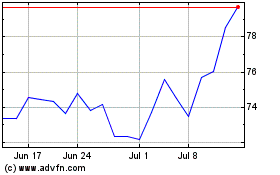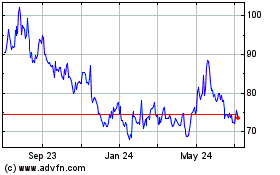Alibaba Switches Lazada CEO Again in Tough E-Commerce Market
June 26 2020 - 8:39AM
Dow Jones News
By Liza Lin and Phred Dvorak
SINGAPORE -- Alibaba Group Holding Ltd. replaced the chief
executive of its Southeast Asia e-commerce unit for the third time
in just over two years, as the Chinese technology giant continues
to struggle to get its international business on track.
Alibaba said it has tapped Chun Li, the head of Lazada's
Indonesia operations, Southeast Asia's biggest market, to take on
the CEO post as well. The move puts a tech expert and veteran of
one of Alibaba's domestic online markets atop Lazada. He succeeds
Pierre Poignant.
Singapore-based Lazada operates in six markets in the
region.
Alibaba has for years been trying to replicate its huge success
at home in markets outside of China. The Hangzhou-based company,
which owns China's two largest e-commerce platforms, has sought to
expand its operations overseas as growth in its domestic market
begins to slow.
Lazada is Alibaba's most high-profile and costliest investment
outside of its home market. It was the biggest e-commerce company
in Southeast Asia -- a region where demand for such services is
expected to explode -- when Alibaba bought a controlling stake in
2016. The Chinese company has poured in at least $4 billion in
investments, revamped Lazada's technology and sent a host of
Alibaba executives to help lead the unit.
Yet Lazada's revenue growth rate overseas has lagged behind
Alibaba's growth in Chinese retail markets, and it has fallen
behind local and regional rivals in important markets -- most
notably Shopee, the e-commerce unit of Singapore-based Sea Ltd.,
which counts another Chinese tech giant, Tencent Holdings Ltd., as
a backer.
About 3% of the region's $587.5 billion in total retail
purchases were conducted online, according to a joint report by
Bain & Co. and Facebook Inc. this year, leaving a lot of space
for the e-commerce market to grow.
During the past year, Lazada fell behind Shopee in the
fast-growing markets of Vietnam and Malaysia in terms of the
average number of people who use the app every month, according to
rankings from data tracker App Annie. Lazada continues to lag
behind in Indonesia, although it has recently shown faster growth
there, analysts and market watchers said.
"The political, economic and cultural differences of the various
Southeast Asian markets makes it difficult for a one-size-fits-all
strategy, as Alibaba has been accustomed to in China," said Tan
Yinglan, a managing partner at Insignia Venture Partners.
Part of Alibaba's challenge has been culture clashes and a
failure at times to understand local markets, people familiar with
the operations said.
The appointment of Mr. Li is an attempt to bridge those cultural
gaps, since he has spent time both in Alibaba's Hangzhou
headquarters, as well as in the region with Lazada, Mr. Tan
said.
Mr. Li had made "huge impact contributions" to Lazada since
joining in 2017, said Lucy Peng, the company's chairman in a letter
to its staff. A former chief technology officer in Alibaba's
enterprise e-commerce unit, Mr. Li had overseen a major technology
upgrade at Lazada and had held the fort for the company in a tough
and competitive market such as Indonesia, Ms. Peng said.
Lazada's new CEO faces both rising competition and opportunity
in the Southeast Asian market, said Florian Hoppe, a partner at
Bain in Singapore. The coronavirus pandemic has led to a huge wave
of new users entering the Southeast Asia e-commerce market,
providing tremendous opportunities for all the players in the
market.
Still, the company continues to face a fierce fight with Shopee
and local operators within individual Southeast Asia for market
share, and the new CEO will need to help Lazada retain the new
users it has attracted recently, Mr. Hoppe said.
Write to Liza Lin at Liza.Lin@wsj.com and Phred Dvorak at
phred.dvorak@wsj.com
(END) Dow Jones Newswires
June 26, 2020 08:24 ET (12:24 GMT)
Copyright (c) 2020 Dow Jones & Company, Inc.
Alibaba (NYSE:BABA)
Historical Stock Chart
From Mar 2024 to Apr 2024

Alibaba (NYSE:BABA)
Historical Stock Chart
From Apr 2023 to Apr 2024
